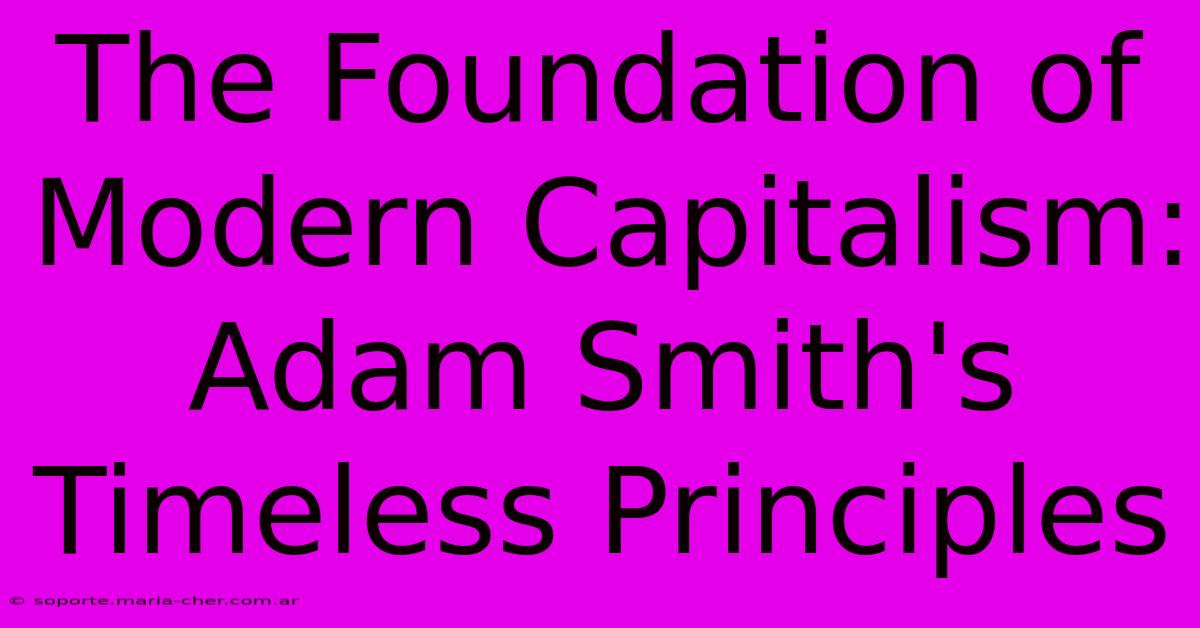The Foundation Of Modern Capitalism: Adam Smith's Timeless Principles

Table of Contents
The Foundation of Modern Capitalism: Adam Smith's Timeless Principles
Adam Smith, an 18th-century Scottish economist, is widely considered the father of modern economics. His magnum opus, The Wealth of Nations, published in 1776, laid the groundwork for understanding capitalism and its underlying principles. While the world has drastically changed since then, Smith's insights remain remarkably relevant and continue to shape economic thought and policy today. This article will delve into the core tenets of Smith's philosophy and explore their enduring legacy.
The Invisible Hand: Self-Interest and the Common Good
One of Smith's most famous concepts is the "invisible hand." This metaphor describes how individuals pursuing their own self-interest, in a free market, unintentionally benefit society as a whole. By striving to maximize their own profits, businesses create jobs, innovate, and offer goods and services that consumers demand. This competition, according to Smith, leads to greater efficiency, lower prices, and a wider variety of choices for everyone.
Competition as a Driving Force:
Smith strongly emphasized the importance of competition. He argued that monopolies stifle innovation and lead to higher prices. A truly free market, he believed, necessitates numerous businesses competing for consumer attention, fostering a dynamic environment of improvement and advancement. This competitive landscape is a cornerstone of his vision of a prosperous society.
Specialization and the Division of Labor
Another key element of Smith's theory is the division of labor. He observed that breaking down complex tasks into smaller, more specialized jobs significantly increased productivity. By focusing on a specific aspect of production, workers become more skilled and efficient, leading to greater output and lower costs. This principle, though seemingly simple, remains a fundamental pillar of modern manufacturing and industrial organization.
Increased Efficiency and Productivity:
The benefits of specialization extend beyond individual workers. It facilitates the development of specialized tools and machinery, further enhancing productivity and reducing the time required to produce goods. This increase in efficiency translates directly into economic growth and improved living standards.
Free Markets and Minimal Government Intervention
Smith advocated for a largely laissez-faire approach to the economy. He believed that government intervention should be minimal, primarily focusing on protecting property rights, enforcing contracts, and providing essential public goods like defense and infrastructure. Excessive regulation, he argued, hinders the natural workings of the market and stifles economic growth.
The Role of Government: A Careful Balance:
While championing free markets, Smith recognized the need for a limited government role. This role, however, should be carefully circumscribed to avoid interfering with the efficient allocation of resources by market forces. The challenge lies in finding the optimal balance between government regulation and economic freedom.
The Enduring Relevance of Smith's Ideas
Despite being written centuries ago, The Wealth of Nations continues to resonate with modern economists and policymakers. The principles of the invisible hand, the division of labor, and limited government intervention remain central to many economic debates today. While criticisms of Smith's work exist, particularly concerning issues of income inequality and market failures, his contributions to our understanding of capitalism are undeniable.
Modern Applications and Criticisms:
Smith's theories are applied worldwide in economic policies, from trade agreements to antitrust laws. However, critics argue that his model overlooks issues like externalities (e.g., pollution), information asymmetry, and the potential for market failures. These criticisms have led to the development of more nuanced economic theories, but Smith's foundational work remains a crucial starting point for understanding modern capitalism.
In conclusion, Adam Smith's The Wealth of Nations provides a timeless framework for understanding the principles of capitalism. While the complexities of the modern economy demand a more nuanced approach, his insights regarding self-interest, competition, specialization, and limited government intervention continue to shape economic thought and policy. Studying his work remains essential for anyone seeking to grasp the foundations of the economic system that governs much of the world today.

Thank you for visiting our website wich cover about The Foundation Of Modern Capitalism: Adam Smith's Timeless Principles. We hope the information provided has been useful to you. Feel free to contact us if you have any questions or need further assistance. See you next time and dont miss to bookmark.
Featured Posts
-
Exclusive Reveal Step Inside The Stunning Perry Homes Meridiana 45 Model Homes
Feb 11, 2025
-
Transform Your Lifestyle In Castroville Perry Homes Palatial Residences
Feb 11, 2025
-
Unleash Your Inner Expert Discover The Traits And Skills Of True Expertise
Feb 11, 2025
-
Unleash The Potential Of Digital Invites The Ultimate Guide To Size Style And Impact
Feb 11, 2025
-
Elevate Your Style With Monica Vinaders Timeless Treasures The Ultimate London Jewellery Destination
Feb 11, 2025
